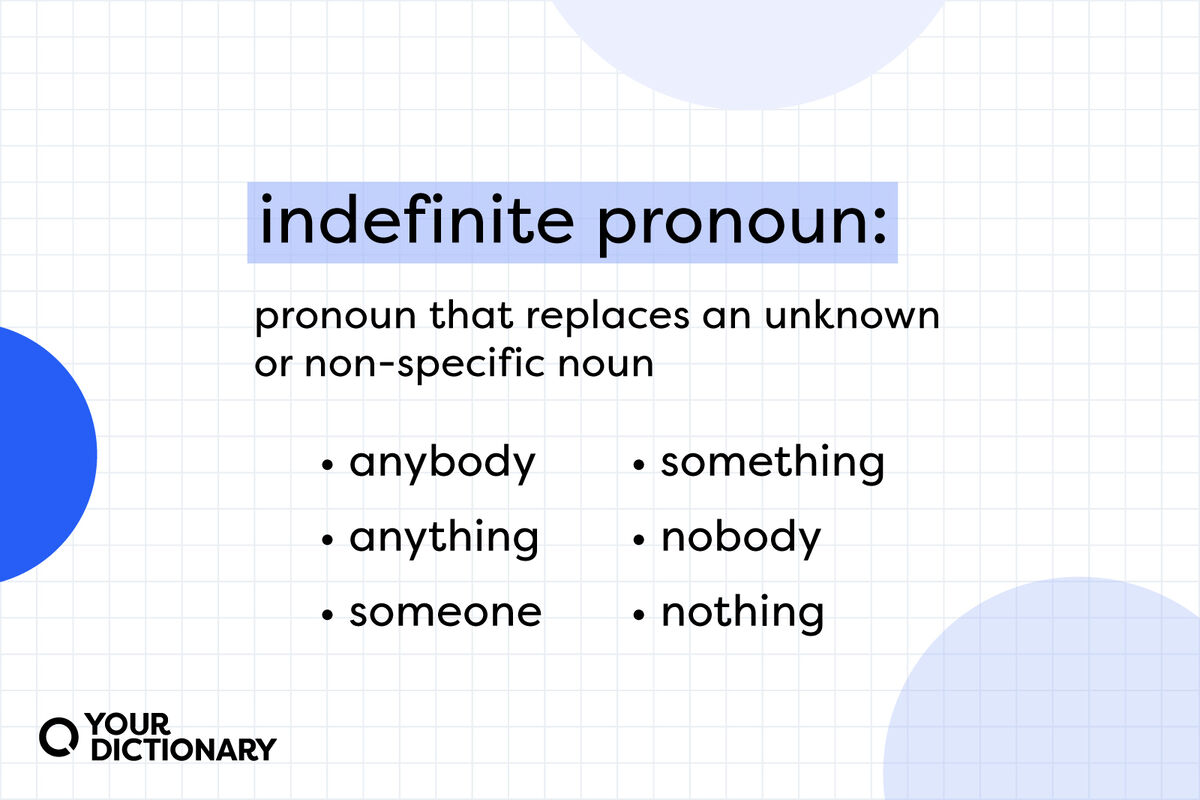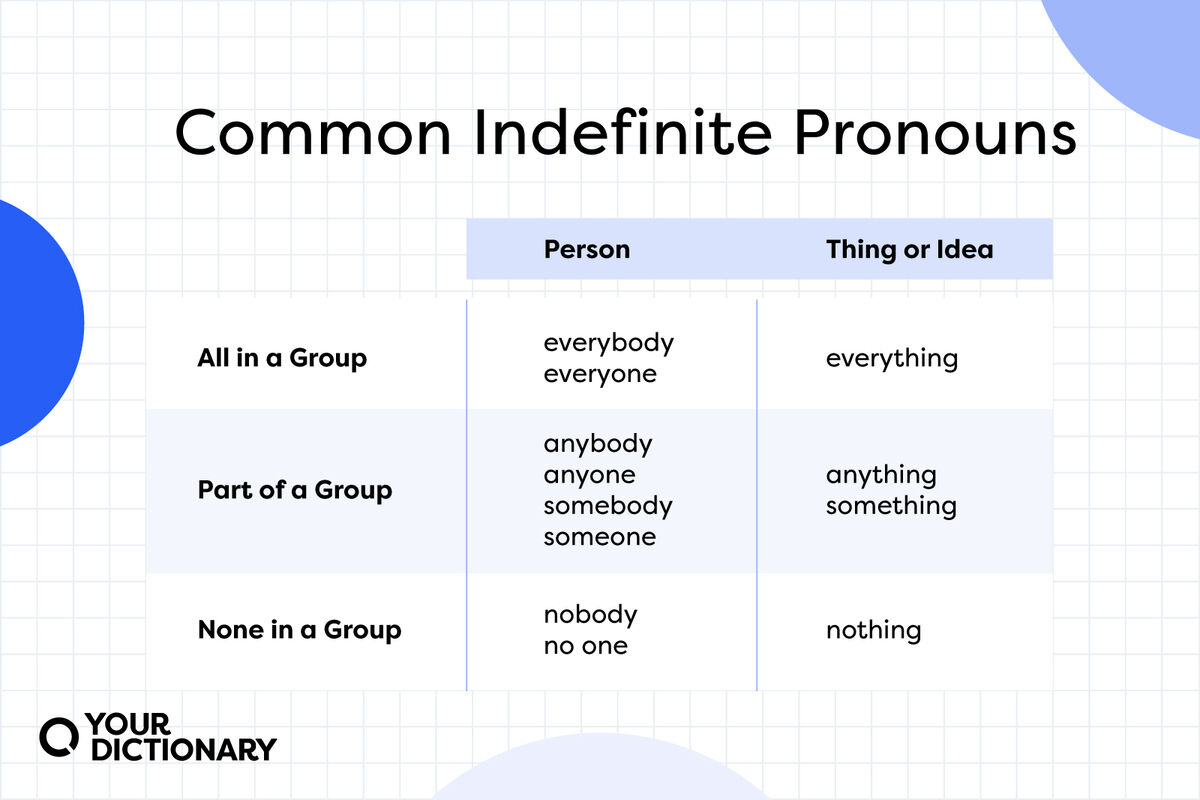
There’s a big difference between everything and nothing. If you asked your friends what they love most about you, you’d much rather hear everything than nothing (talk about a confidence killer). But these words also have a lot in common: They’re both indefinite pronouns, and if you’re trying to describe something in a non-specific way, they’re both words you want to know.
What Are Indefinite Pronouns?
Indefinite pronouns stand in for nouns that aren’t specific. They’re pronouns because they replace nouns — but the nouns they’re replacing are often unknown.
- Somebody threw a snowball at me. (Who is somebody?)
- Does anyone know who started the snowball fight? (Who is anyone?)
- Nobody will tell me what they know. (Who is nobody?)
- Several admitted to making snowballs, but not throwing them. (Who is several?)
- I’ll just avoid everyone in snow forts from now on. (Who is everyone?)
Indefinite pronouns also make it easier to talk quickly and efficiently with people. Look at the following two examples. Which is easier to understand and quicker to say?
- Mary, Mike, Steve, and Kate are meeting us at the restaurant.
- Everyone is meeting us at the restaurant.
List of Indefinite Pronouns
You use indefinite pronouns when you’re not sure who or what you’re talking about. You can also use them when you’re referring to all the members of a group, some of the members of a group, or none of the members of a group.
Common indefinite pronouns include:

Other Indefinite Pronouns
While most indefinite pronouns do end in -body, -one, or -thing, those aren’t the only words that function as indefinite pronouns in English.
|
Indefinite Pronoun |
Nouns They Replace |
|
another |
one more; a different noun |
|
both |
each member of a group of two |
|
each |
every one of a group |
|
either |
one or the other in a group of two |
|
few |
a small amount of a group |
|
fewer |
an even smaller amount of a group |
|
little |
not very much |
|
many |
several nouns (countable) |
|
much |
a large amount of a noun (uncountable) |
|
neither |
none in a group of two |
|
one |
a hypothetical person |
|
others |
different nouns in a group |
|
several |
most members of a group |
Indefinite Pronoun Agreement
When indefinite pronouns appear in a sentence, they must agree with the verbs in the sentence (also known as subject-verb agreement). That’s why we divide indefinite pronouns into singular indefinite pronouns and plural indefinite pronouns.
Singular Indefinite Pronoun Agreement
Any indefinite pronoun that ends in -one, -body, or -thing is considered a singular pronoun — even pronouns that address more than one noun, such as everyone, everybody, and everything. They use singular verbs, just like other singular pronouns.
- Everybody wants to go camping.
- No one understands my poem.
- Something smells really bad.
- Anything is better than this.
Plural Indefinite Pronoun Agreement
Plural indefinite pronouns, on the other hand, replace plural nouns or pronouns, so they use plural verbs. Words such as both, many, others, and several are plural indefinite pronouns.
- Several want to go camping.
- Others understand my poem.
- Both smell really bad.
- Many are better than this.
How To Use Indefinite Pronouns in a Sentence
It seems like using indefinite pronouns is pretty straightforward. But not every indefinite pronoun works in every sentence — it all depends on what you’re trying to say (or ask).
Examples of Indefinite Pronouns in Positive Sentences
Positive sentences, also known as positive statements, aren’t just sentences in good moods. They don’t include the word not, and they can use any indefinite pronoun they want for that reason.
- Everything looks just lovely.
- Anyone can join the party.
- We have nothing to offer.
- My purse has to be somewhere.
- No one bought me a birthday present.
- Everybody admires Mr. Houston.
Examples of Indefinite Pronouns in Negative Sentences
Negative sentences do have the word not (or a contraction of the word not, such as don’t or couldn’t). For that reason, they don’t include indefinite pronouns that start with no (to avoid double negatives).
- Incorrect: We can’t have nothing nice.
- Correct: We can’t have anything nice.
- Incorrect: I don’t know nobody at this party.
- Incorrect: I don’t know anybody at this party.
It’s also rare to find negative sentences that use indefinite pronouns that begin with every. However, in sentences that are specifically about not having all the nouns (“You can’t have everything” or “I don’t know everybody”), it is grammatically correct.
Examples of Indefinite Pronouns in Questions
Questions with indefinite pronouns are usually “yes” or “no” questions. They also don’t usually include indefinite pronouns that begin with “no.”
- Can anyone reach the top shelf?
- Has everybody responded to your text?
- Is something bothering you?
- Did you go anywhere for winter break?
Indefinite Pronoun Quiz
Which indefinite pronoun fits best in the following sentences?
- (Anyone, No one) came to my graduation.
- Can (somebody, nobody) help me?
- I want to meet (someone, anyone) special at the dance.
- (Nothing, Everything) is good enough for Roger.
- We don’t have (nothing, anything) to hide.
- Mariah heard a rumor about (someone, anyone).
Answer Key for Indefinite Pronoun Quiz
Check your answers to see how you did!
- (
Anyone, No one) came to my graduation. - Can (somebody,
nobody) help me? - I want to meet (someone,
anyone) special at the dance. - (Nothing,
Everything) is good enough for Roger. - We don’t have (
nothing, anything) to hide. - Mariah heard a rumor about (someone,
anyone).